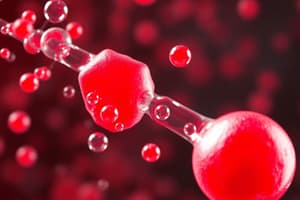Podcast
Questions and Answers
What is the process that often involves the formation of covalent bonds in the maturation of proteins into their final state?
What is the process that often involves the formation of covalent bonds in the maturation of proteins into their final state?
Posttranslational modification
What are the larger precursors of polypeptides called?
What are the larger precursors of polypeptides called?
Proproteins
What do the leader sequences in proproteins target?
What do the leader sequences in proproteins target?
A particular organelle or facilitate passage through a membrane
What ensures that the potential harmful activity of a protein remains inhibited until it reaches its final destination?
What ensures that the potential harmful activity of a protein remains inhibited until it reaches its final destination?
What may covalent modifications add to a protein?
What may covalent modifications add to a protein?
Flashcards are hidden until you start studying
Study Notes
Post-Translational Modifications of Proteins
- The process that often involves the formation of covalent bonds in the maturation of proteins into their final state is post-translational modification.
Protein Precursors
- The larger precursors of polypeptides are called proproteins.
Leader Sequences
- The leader sequences in proproteins target specific organelles or locations within the cell.
Protein Regulation
- The potential harmful activity of a protein remains inhibited until it reaches its final destination, ensured by the proregion or prosequence.
Covalent Modifications
- Covalent modifications may add carbohydrate molecules (glycosylation), lipids (lipidation), or phosphate groups (phosphorylation) to a protein, altering its function or localization.
Studying That Suits You
Use AI to generate personalized quizzes and flashcards to suit your learning preferences.


